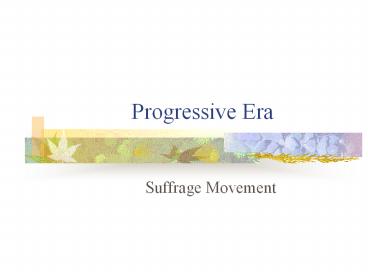Progressive Era PowerPoint PPT Presentation
1 / 33
Title: Progressive Era
1
Progressive Era
- Suffrage Movement
2
Predecessors to 1900s Feminism
3
Abigail Adams
4
Abigail Adams
- 1744-1818
- Wife to President John Adams
- Urged her husband to Remember the Ladies when
he was forming the new United States - See letters
5
Most women were not given formal educations nor
allowed to have professional jobs.
6
Emma Willard
- 1787-1870
- Operated in the realm of domesticity
- Asks state of New York for public money to
educate girls
7
Emma Willard School (1821)Still an all girls
secondary boarding school. Tuition (inc. room
and board)- 33,750
8
Education is on the rise. The main professional
job is teaching, although education is still
dominated by men.
9
The fight for equal rights begins with the fight
against slavery (abolitionism)
10
Sara Grimke
- 1792-1873
- Daughter of slave-holding judge
- Father believed in the subordination and no
education of women - Well-educated abolitionist
- Becomes a Quaker
11
Angelina Grimke
- 1805-1879
- Saras sister
- Becomes a strong abolitionist and Quaker
- Lectures and publishes letters condeming slavery
- Opened a school with her sister
12
Grimke sisters were harassed and criticized
because they dared to voice their opinions in
public with men in the audience (considered to be
promiscuous).
13
Lucretia Mott
- 1793-1880
- From a Quaker family
- Abolitionist
- A teacher who discovered men were paid twice as
much as women - Leader of womens right movement
- Helped establish Seneca Falls Convention
14
Lucy Stone
15
Lucy Stone
- 1818-1893
- Father against education for women
- Graduated from Oberlin College 1847
- Lectured against slavery
- Helped organize American Woman Suffrage
Organization
16
Many women who fought early on for womens rights
had supportive husbands who also believed in
equality between the sexes. Is there a
connection between the men these women married
and their accomplishments?
17
Elizabeth Cady Stanton
18
Stanton powerful womens rights leader.
- 1815-1902
- Quaker teacher and abolitionist
- Force behind Seneca Falls Convention
- Wrote Declaration of Sentiments
- Later fought for women suffrage
19
Susan B. Anthony
- 1820-1906
- Quaker abolitionist (although criticized for
racist writings) - She never married
- Worked on Seneca Falls Convention
- Was arrested for trying to vote in 1872 with the
passage of the 15th Amendment
20
Inseparable Pair- Stanton and Anthony
- Seneca Falls Convention- July 19-20, 1848
- To convince others for more womens rights
- Formed the National Women Suffrage Association
21
Womens Christian Temperance Movement
- Organized in 1874
- Believed alcohol was the cause of problems with
society and families - Would march to saloons and sing hyms
- Acceptable political activity for women to be
involved - Eventually endorsed womens suffrage
22
Progressive Suffragetts
23
Anna Shaw
- 1847-1919
- Immigrated from England 1851
- Methodist minister (first woman)
- doctor
- Joined WCTU
- Pres. National American Women Suffrage
Organization
24
Shaws short teaching career
- Began teaching at 15 years old
- Worked 5 miles from home
- Roomed with students family
- Paid 2 a week for teaching
- Was paid at the end of the year
- Enrolled in a high school after one year
25
Jane Addams
- 1860-1935
- Graduated from Rockford College
- Founded Settlement House Movement (Hull House)
- Worked for Womens Suffrage
26
Jane Addams Cont.
- Against World War I
- Helped found NAACP
- 1931 Received Nobel Peace Prize (1st American
Woman)
27
Florence Kelley
- 1859-1932
- PhD Sociology (University of Zurich)
- Beaten by husband until she escaped to Hull House
where she began working - Organized boycotts of sweatshop products
- Worked for child labor laws and womens suffrage
- Helped organize NAACP
28
Carrie Chapman Catt
- 1859-1947
- Graduated from Iowa State College 1880
- National American Women Suffrage Organization
- 1st pres. League of Women Voters
29
Alice Paul
- 1885-1977
- Another Quaker
- Part of NAWSO but split and began Congressional
Union for Women Suffrage - Coordinated many marches for suffrage
30
Suffragettes March for Votes
31
Some states allow women the right to vote.
- Wyoming, Montana
- Why Western, under-populated states first?
32
Jeanette Rankin
- First female U.S. House of Representative
- From Montana
- 1916
33
Votes for Women Granted 1919!
- 19th amendment

